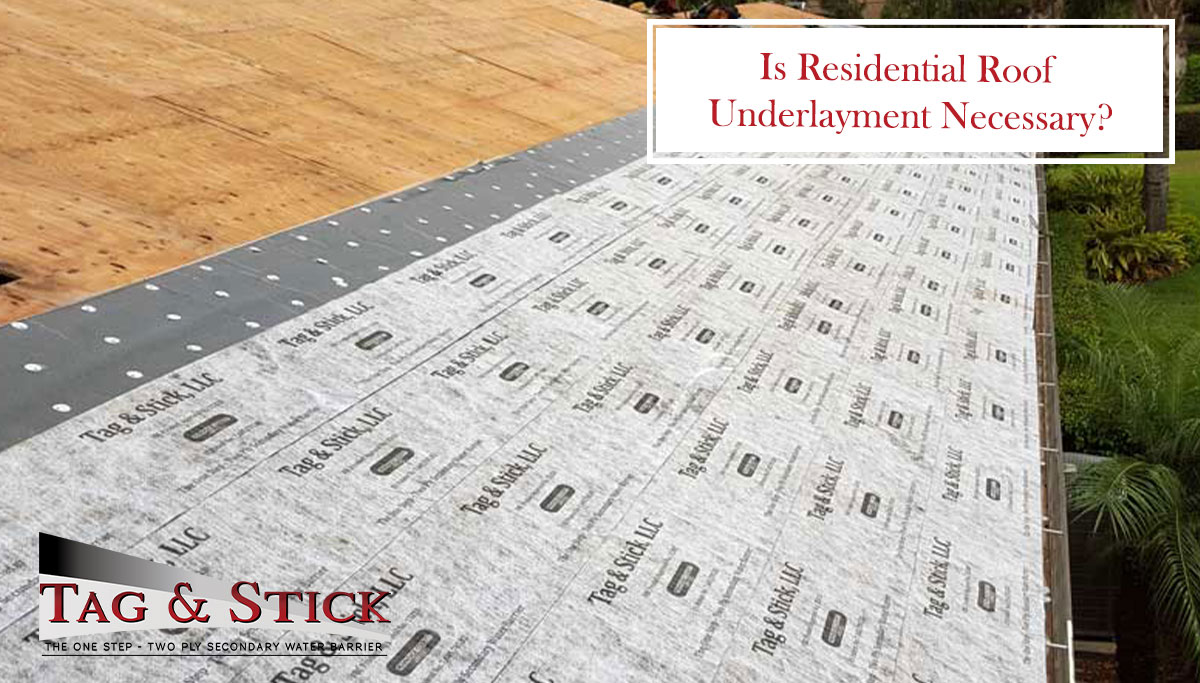Is Residential Roof Underlayment Necessary?
Residential roof underlayment can sometimes be regarded as a waste of time and money; other roofing professionals believe it is necessary to ensure that the whole roofing system works efficiently. A home is ultimately protected by the integrity of the roof, through quality roofing materials and good workmanship. It’s the underlayment that forms an essential part of keeping a home dry and safe during windy and rainy seasons. At Tag & Stick, we’ve come to understand the importance of quality roof underlayment for a residential property.
What Is The Purpose Of Residential Roof Underlayment?
Roofing underlayment is a type of material that is applied directly to the roof deck before the tile, shingles, metal, or other approved coverings are installed. Its main purpose is to provide a waterproof barrier, avoiding any damaging effects caused by severe weather conditions. It is also aimed at preventing leaks from causing any damage to your home.
It is commonly assumed that the roof coverings provide enough protection, without needing further layers. The truth is, although the roof coverings do provide relatively good coverage, they do not offer enough protection: the kind a homeowner needs when living in an area prone to strong winds and heavy rains. Roofing underlayment protects your roofing deck and your home from natural phenomena.
All roof systems require an underlayment, whether you’re doing a re-roofing or installing a new roof, adding residential roof underlayment will:
- Provides primary waterproofing to your home;
- Extend the longevity of your roof;
- Protect your family from water intrusion during a storm;
- Add an extra layer of protection should your roof coverings become damaged in a storm. Should the roof coverings themselves become damaged, there will still be a layer of protection available until the roofing materials can be replaced. Roof coverings are a good defense against sun rays, winds, and rain, but ultimately cannot carry all the responsibility.
- Protect low-sloping roofs from areas where water tends to accumulate, which can cause water damage.
What Type of Underlayment Should I Use?
It is commonly known that there are three types of underlayment systems used:
- Rubberized asphalt underlayment, which uses a combination of asphalt and rubber polymers.
- Non-bitumen synthetic underlayment, also referred to as synthetic underlayment. The underlayment uses saturated asphalt as well as fiberglass components.
- Asphalt-saturated felt, which combines cellulose, bitumen, asphalt, and polyester.
More recently, peel-and-stick underlayments such as Tag & Stick have grown in popularity for their ease of application without compromising waterproofing efficiency. It is two layers that require a one-step application without needing to prime the deck, or any other chemicals to attach the underlayment to the roof deck.
When re-roofing, Tag & Stick works with existing flashings and battens; removing the underlayment will not cause damage to the decking. It is an ideal residential roofing underlayment because it works for steep-sloped residential roofing systems like tiles, metal, shakes, and shingles.
Residential Roof Underlayment In South Florida
South Florida is familiar with strong winds and heavy rains, which can leave homeowners frustrated with constant roofing maintenance and repairs. Tag & Stick meets the South Florida wind uplift code requirements, which means your roof will be safer when wind speeds get out of control.
Tag & Stick is a proven mechanical attachment, self-adhering system that allows you to perform quality workmanship on projects. For more information on using Tag & Stick for your next roofing job, call us at 954-255-3107.
